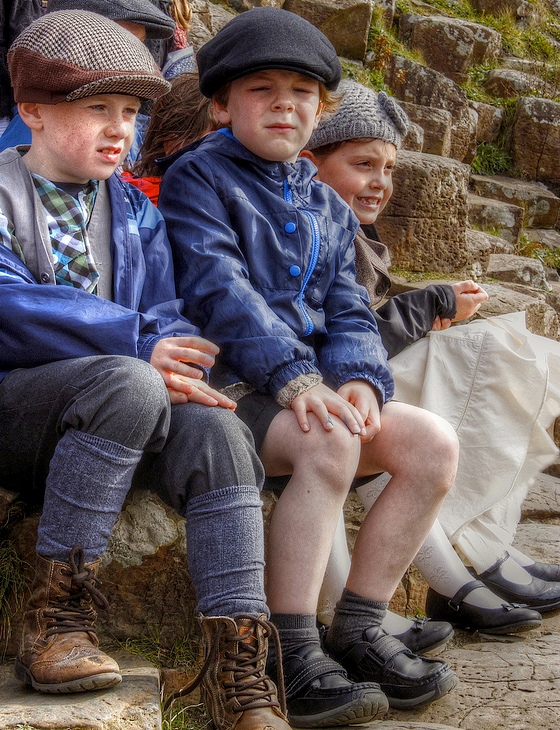"Tackling child poverty in Northern Ireland"
October 28th, 2013Child poverty is a serious issue impacting Northern Ireland, with rates far higher than experienced across Great Britain. Tackling this issue would have social and economic benefits, writes Osmi Anannya, 26, a Commonwealth Correspondent from Bangladesh.
Northern Ireland faces many challenges when it comes to eradicating child poverty.
Apart from the fact that persistent poverty in Northern Ireland (21 percent before housing costs) is double that of Great Britain (9 percent), Irish society is still emerging from over 30 years of conflict colloquially termed as “The Troubles”.
The most disadvantaged children in Northern Ireland live in communities which face both social exclusion and violence, regarded by many as a legacy of the conflict.
Research has shown that every other child in Northern Ireland can expect to experience poverty at some point in their lives. These figures are truly shocking since Northern Ireland is the sixth largest economy in the world.
Many children in the region are unable to afford social activities considered standard for their age, including school trips, the cinema or pursuing hobbies – creating social exclusion for them at school. When necessities in life for such young kids start to pose as a luxury rarely afforded, the environment becomes really depressing and can impact their education attainment as well as their social development and well-being.
Cheaper leisure facilities should be provided for young children in the region.
Furthermore, a notable issue of conflict with teachers and educational establishments in the region should also be addressed. Pupils have sometimes expressed the lack of respect shown by teachers to them, often has an effect on their educational success, because children need a sense of respect coming from their teachers at school.
Owing to the legacy of “The Troubles”, violence in Northern Ireland is generally more accepted than is the norm. A ‘recourse to violence’ as a means to end violence is looked upon in most societies as unacceptable behaviour, rather than the correct response to conflict resolution. However, for Ireland particularly, violence is often perceived to be a rather standard response to opposing an unfavourable situation, sometimes even going as far as drawing attention to grievances and injustices.
Child poverty costs to the public purse are quite high – £25bn each year in costs to the Exchequer and reduced GDP. Since 2010— 2011, the average earnings of those in paid work have fallen and this is forecast to continue until 2014-2015. In the face of ongoing cuts to funding and executive spending, there are set to be even more job losses. Already single parents with one child are trying to survive on approximately £7000 annually, and for a couple with two children about £12,500 annually. About 40,000 children are living in severe poverty – children often do not have heating in their households, nor can they afford a proper cooked meal.
The percentage of families experiencing transient poverty, persistent poverty, and periods of time spent moving in and out of poverty in the region is consistently higher than in the rest of the United Kingdom.
Worklessness and being on benefits for extended periods of time make older generations worry that young people will be enticed by paramilitary groups if society does not begin to address their social exclusion. A frequently cited obstacle to obtaining a well-paid job in the region is a lack of qualifications. In the most disadvantaged areas of Northern Ireland many men under the age of 35 lack basic qualifications and thus find it difficult to earn a decent living.
Persistent poverty in Northern Ireland is quite damaging: families often experience poverty relentlessly, without a single worker in the family for a long time. In fact 31 percent of the working-age population is not in paid work. Alongside these high unemployment figures, key barriers to tackling child poverty include high rates of disability, long-term illness, low wages, availability of only poor-quality part-time jobs and the various obstacles facing mothers who want to work: from no or low qualifications to a lack of affordable childcare, particularly in poorer areas.
Women’s economic activity rates in the region are primarily influenced by their children. According to research by Joseph Rowntree Foundation, 73 percent of women with no children are in paid work, as opposed to the 64 percent of women with two children. Similarly, women with young ones under the age of ten are less likely to be in paid work, along with women who are single parents. More young women with children in the age group of 11 – 15 years are likely to work, as are young women who are part of a couple, sharing the responsibilities of childcare and being a family.
‘Mini-jobs’ (or part-time work) often offer some solace to both single mothers and mothers part of a couple because they can opt for part-time jobs which help with caring responsibilities for their children. A quarter of a million jobs in Northern Ireland are part-time, and a majority of them are held by women.
Childcare provision also plays an important role in women’s ability to take up and retain employment, except that it’s the most expensive in the United Kingdom. Data shows that the lack of availability of childcare can be correlated with deprived estates, so perhaps childcare provision aimed at supporting parents to enter and remain in the labour market should be introduced.
photo credit: psyberartist via photopin cc
………………………………………………………………………………
About me:
I’m from Dhaka, Bangladesh. I’m a Computing student at UCSI University and a Correspondent for The New Federalist and Shifting Grounds, a PS Helper at The Student Room, a Politics and Current Affairs Blogger at BlogActiv and UACES, and a STEMNet and IMechE Ambassador.
…………………………………………………………………………………………………………………
Opinions expressed in this article are those of the author and do not necessarily represent the views of the Commonwealth Youth Programme. Articles are published in a spirit of dialogue, respect and understanding. If you disagree, why not submit a response?
To learn more about becoming a Commonwealth Correspondent please visit: http://www.yourcommonwealth.org/submit-articles/commonwealthcorrespondents/
………………………………………………………………………………………………………………





